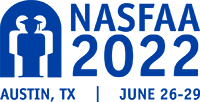Pell for Incarcerated Students: The Road to Implementation & Perspectives From the Field
By Hugh T. Ferguson, NASFAA Managing Editor
Moderator:
Rachel Gentry, Director of Government Relations at NASFAA
Speakers:
Tracy P. Williams, Re-Entry Specialist at Lee College
Felipe Leal, Director of Financial aid at Lee College
Allan Wachendorfer, Senior Program Associate at the Vera Institute of Justice
Beginning July 1, 2023 incarcerated students enrolled in eligible programs will have access to the Pell Grant program restored and the Department of Education (ED) plans on publishing new regulations and guidance concerning eligibility for college-in-prison programs, which will lead to new questions for institutions looking to ensure eligible students can access the funding.
In order to help schools work through the logistics of the impending regulations and get them updated on where Pell Grant restoration implementation stands today, a group of financial aid experts involved in Second Chance Pell offered insights around how institutions can prepare to effectively support incarcerated students.
The panel was moderated by Rachel Gentry, NASFAA's director of government relations, who fielded a litany of regulatory and programmatic questions into how the federal government has gone about bringing these long-awaited updates to the program.
Currently the Second Chance Pell experiment, in its recently expanded form, allows approved institutions of higher education to provide Pell Grants to incarcerated students.
For NASFAA, Pell restoration serves as an important matter of social and racial justice, with Gentry applauding the continued expansion of the Second Chance experiment.
The panelists brought a wide range of experience to detail how institutions can prepare to effectively support incarcerated students.
Allan Wachendorfer, senior program associate at the Vera Institute of Justice, highlighted why the work into Pell Grant expansion is so important and how the 1994 Violent Crime Control and Law Enforcement Act has limited the funding options for the program, which has winnowed in the last 28 years.
With the ban on Pell Grants for prisoners being lifted, ED began the negotiated rulemaking process to work through a regulatory framework. Once the proposed language is unveiled, a public comment period will open. Final regulations must be published by Nov. 1, 2022 to be able to take effect July 1, 2023.
The expansion of Second Chance Pell will have significant crossover with financial aid offices, as part of the process relates to accreditation, waiver requirements, and varying timelines associated with program implementation, as well as factors concerning the best interest of students.
The conversation also focused on advocacy efforts to make the program more equitable and get guardrails in place to ensure the programs with demonstrated success aren't banned.
On the FAFSA application, Felipe Leal, director of financial aid at Lee College, provided on-the-ground insight of the application process with registration days, usage of paper applications, and the systems his institution has utilized to help students navigate the process.
Tracy Williams, a re-entry specialist and adjunct instructor at the Lee College Huntsville Center, discussed strategies his institution used to help students fill out the FAFSA and how formerly incarcerated students have been integral in helping to streamline the process for current students.
Overall, the panelists looked to underscore and emphasize the need for top-to-bottom buy-in from institutions to work through the varying barriers and extra time it takes to assist students in accessing these funds.
Publication Date: 6/27/2022

You must be logged in to comment on this page.